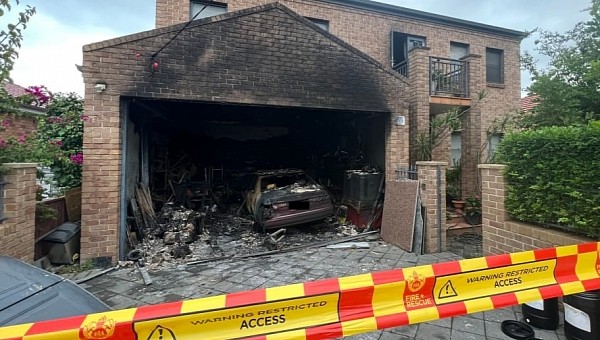Every good thing has a bad side, and as the world embraces the marvels of going electric, lithium-ion batteries are a constant headache to auto manufacturers. Chevrolet’s Bolt, Hyundai’s Kona, and Lucid EVs have been at the center of recalls related to battery fires. At about 8 pm on Sunday, a man was forced to jump out from the second floor of his Eastgardens home in Sydney, Australia, following an e-bike explosion.
According to investigators, the fire was caused by a faulty lithium-ion battery on an e-bike in the home’s garage. The battery exploded, causing a fire that consequently damaged the house, destroying valuables in the garage, including a car.
14 Fire and Rescue NSW trucks responded to the 8 pm incident in Mathewson Street, in Sydney’s east.
The fire spread through the garage and ground floor of the Eastgardens, Sydney home. Fortunately, no one was hurt. Everyone in the building, including the man who jumped from the two-story balcony, escaped unscathed.
After the fire was contained, Hazardous Material Fire Fighters (HAZMAT) removed several other lithium-ion batteries from the garage. They were concerned they had been compromised by the fire and could ignite or explode.
They also immersed the e-bike battery in water to prevent re-ignition and stayed overnight to monitor the situation.
The Fire and Rescue New South Wales issued a statement warning the public about faulty or overcharged Li-Ion batteries. According to the rescue team, the batteries can discharge gas and explode, causing an intense fire that is difficult to extinguish.
While the shift towards electric vehicles is moving swiftly, battery technology is developing slowly. And as difficult as it is to admit, virtually all companies at the forefront of battery-powered automobiles are way behind in technology.
As consumers marvel at the intricacies of battery-powered vehicles and their advantages over the now-archaic internal combustion engines, battery technology hasn’t really taken leaps since it was discovered around two centuries ago.
In reality, the biggest obstacle to EV manufacturers revolve around battery technology, specifically rapid charging, range, and volatility.
In their statement, FRNSW advised Sydney residents to use reputable and compatible Li-Ion brands and avoid overcharging their gadgets, especially when asleep or away.
Li-Ion batteries are highly energy-dense and contain flammable electrolytes. Therefore, overcharging, exposure to extreme temperatures, short-circuiting, or physical abuse could lead to fires.
That said, there are several different lithium chemistries in use by various manufacturers (with variable advantages and disadvantages) – some are less likely to fail and cause a fire than others.
To protect yourself in case of a fire, it’s advisable to have working smoke alarms installed in your building and home escape plans – just in case.
If you are curious about the volatility of lithium-ion batteries, we recommend checking out this Auto Guide piece in our archive.
14 Fire and Rescue NSW trucks responded to the 8 pm incident in Mathewson Street, in Sydney’s east.
The fire spread through the garage and ground floor of the Eastgardens, Sydney home. Fortunately, no one was hurt. Everyone in the building, including the man who jumped from the two-story balcony, escaped unscathed.
After the fire was contained, Hazardous Material Fire Fighters (HAZMAT) removed several other lithium-ion batteries from the garage. They were concerned they had been compromised by the fire and could ignite or explode.
They also immersed the e-bike battery in water to prevent re-ignition and stayed overnight to monitor the situation.
The Fire and Rescue New South Wales issued a statement warning the public about faulty or overcharged Li-Ion batteries. According to the rescue team, the batteries can discharge gas and explode, causing an intense fire that is difficult to extinguish.
While the shift towards electric vehicles is moving swiftly, battery technology is developing slowly. And as difficult as it is to admit, virtually all companies at the forefront of battery-powered automobiles are way behind in technology.
As consumers marvel at the intricacies of battery-powered vehicles and their advantages over the now-archaic internal combustion engines, battery technology hasn’t really taken leaps since it was discovered around two centuries ago.
In reality, the biggest obstacle to EV manufacturers revolve around battery technology, specifically rapid charging, range, and volatility.
In their statement, FRNSW advised Sydney residents to use reputable and compatible Li-Ion brands and avoid overcharging their gadgets, especially when asleep or away.
Li-Ion batteries are highly energy-dense and contain flammable electrolytes. Therefore, overcharging, exposure to extreme temperatures, short-circuiting, or physical abuse could lead to fires.
That said, there are several different lithium chemistries in use by various manufacturers (with variable advantages and disadvantages) – some are less likely to fail and cause a fire than others.
To protect yourself in case of a fire, it’s advisable to have working smoke alarms installed in your building and home escape plans – just in case.
If you are curious about the volatility of lithium-ion batteries, we recommend checking out this Auto Guide piece in our archive.
EASTGARDENS | e-bike explodes in flames, spreads to home - VIDEO. An e-bike has exploded in flames, which have spread through the garage and ground floor of a home at Eastgardens, in Sydney's east.
— Fire and Rescue NSW (@FRNSW) March 19, 2023
Fourteen Fire and Rescue NSW (FRNSW) trucks at... https://t.co/tOlntkOnfg






